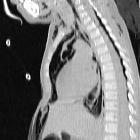intraspinal air











Pneumorrhachis refers to the presence of gas within the spinal canal (either intra- or extradural). It is rare.
Clinical presentation
Patients can often be asymptomatic .
Pathology
Etiology
Pneumorrhachis can result from a number of causes:
- trauma (traumatic pneumorrhachis): can occur in a variety of traumatic settings
- traumatic pneumothorax
- blunt chest trauma
- subarachnoid-pleural fistula
- skull fracture
- iatrogenic / post surgical
- epidural anesthesia
- thoracic / lumbar surgery
- non-traumatic
- spontaneous pneumomediastinum (e.g. from bronchial asthma, Hamman syndrome)
- regional necrotizing fasciitis (rare)
- marijuana smoking
- cocaine snorting
Treatment and prognosis
Patients with pneumorrhachis usually are managed conservatively. The entrapped gas occupying parts of the cerebrospinal compartment may cause syndromes of both intracranial and intraspinal hypertension, as well as hypotension as a consequence to either an increase or decrease of intracranial and intraspinal pressure .
Pneumorrhachis can in rare cases cause symptoms of cord compression and may even require decompressive surgery. Hence, rapid evaluation and diagnosis remain important .
History and etymology
The term pneumorrhachis derives from the Ancient Greek, πνεῦμα (pneuma) meaning air and ῥάχις (rachis) meaning spine.
Differential diagnosis
Consider intradiscal gas from degenerative disc disease . A posteriorly bulging disc containing gas, in particular, may appear intrathecal in location. Sagittal views are helpful in establishing location of gas.
See also
Siehe auch:
- Pneumothorax
- Vakuumphänomen im Wirbelkörper
- Mediastinalemphysem
- Nekrotisierende Fasziitis
- epidurales Gas / Luft
- Boerhaave-Syndrom
- Fett im Subarachnoidalraum
- spontanes Pneumomediastinum
- epidurales Gas der LWS
- the epidural gas pseudocyst – a treatable cause of back pain
- intraspinale Blutungen
und weiter:

 Assoziationen und Differentialdiagnosen zu intraspinale Luft / Gas:
Assoziationen und Differentialdiagnosen zu intraspinale Luft / Gas:






